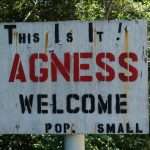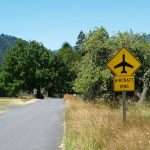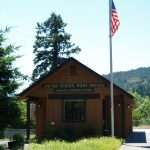The BBC ‘First Person’ report today carries a story of plans by the United States Post Office to close as many as 3,500 branches and make 120,000 people redundant in an attempt to reduce its $10 billion deficit. Evan Kalish, the 25 year old graduate who is the first person of the report, talks of his journeying across the United States to visit as many as possible of the rural post offices and talks of their importance in creating communities.
His endeavours might have seemed analogous to trainspotting were it not for a moment in July when the 57 degrees Fahrenheit temperature and the biting wind of the Oregon coast prompted a journey inland from the town of Gold Beach. Visiting a forest park ten miles or so inland, the temperature had risen by thirty degrees. Walking beside the river for very long seemed unattractive, so we returned to the air conditioning of our four litre Dodge.
At the entrance to the car park, a sign pointed coastwards to Gold Beach and inland to a town called Agness, some 23 miles away. We decided to visit Agness. The journey was slowed by repeated roadworks and we finally reached a junction where the road to Agness, and nowhere else was to the left.
There were obviously others who had made the journey in the past and who had experienced a reaction similar to the one awaiting us. A place with such a sense of humour was worth a stop. Having grown up in England where a county town might have a population of 100,000, to describe the population of Agness as small is probably an understatement.
There was a shop that, amongst other things, sold cold beer and ice creams, and a grass airstrip that crossed the road and went uphill, and, beyond the airstrip, a school. In the warmth of the July sun, it was hard to imagine what the place might be like in deep winter, and hard to guess how many people there might be living in the hills around. If Gold Beach was thirty odd miles away, maybe the community here was much bigger than it appeared.
What put Agness on the map, though, with a Zip code of 97406, was its post office. Later on our West Coast journey, someone explained that the post office was often the first place established when new communities were emerging in the late nineteenth and early twentieth centuries. The post office conferred status in a place, gave its community an official standing.
If the BBC report is correct, then places like the post office at Agness are under threat, and when they are gone, what marks of community are left? What have people left to share in common if the one building that united them is gone?



